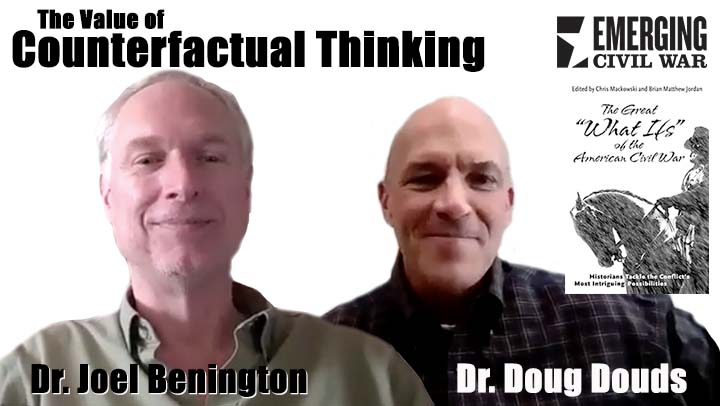ECW Podcast: Counterfactual Thinking (with Joel Benington and Doug Douds)
How can counterfactual thinking help us improve our critical thinking skills? How can it help us better understand the world around us? How useful is it in the field of history? This episode of the Emerging Civil War Podcast features interviews with two guests: Dr. Joel Benington, professor of biology at St. Bonaventure University, who teaches an Honors class on counterfactual thinking, and Dr. Doug Douds of the Army War College, who uses counterfactual thinking on staff rides and in the classroom.
If you like to ask “What if,” then this week’s episode is sure to be enlightening. And if you’re one of those folks who poo-poos “What if” questions, this episode should help you reconsider.
This episode of the Emerging Civil War Podcast is brought to you by Civil War Trails, the world’s largest open-air museum, offering more than 1,500 sites across six states. Request a brochure at civilwartrails.org to start planning your trip today.
You can listen on Spotify here:
You can listen on Apple Podcasts here:
You can also listen through the ECW Patreon page. A subscription to our Patreon page—which helps pay our podcast costs—also entitles you to exclusive free content. Sign up for as little as $1.99/month: https://www.patreon.com/emergingcivilwar.

“What if?” is wonderful…as long as one recognizes its limits. For example, the most popular What if? of the Civil War: Ewell’s actions at the first day of Gettysburg.
For over a century people have insisted, “If Ewell had obeyed Lee’s order and attacked Cemetery Hill, the South would have won the war.” That’s going way beyond the limits. We know these facts: I and II Corps were defeated, disorganized, discouraged, and many of them without arms as they fled through Gettysburg on the afternoon of July 1, 1863. When they reached Cemetery Hill, no one bothered to occupy, much less fortify, Culp’s Hill, to the north, or the hill north of Culp’s, for many hours. So, we know that if Ewell attacked, he would have surely driven the Federals off Cemetery Hill, and by dark the Confederates would have been in possession of all of Cemetery Ridge – and thus we know that the Confederates would have won the Battle of Gettysburg.
But that is all. We cannot predict, or think we know, anything further, because too many variables enter. All we can know is that the Confederates would have won Gettysburg, because Meade would have either come up next day, taken one look at the Confederate defenses, and opted to withdraw to a better line, and thus Gettysburg would have been a one-day Confederate victory, or Meade would have attacked over the next two or three days, been repulsed with terrible losses, and thus Gettysburg would have been a three or four-day Confederate victory. But we cannot know anything beyond these scenarios. How the armies would have maneuvered after this, if Lee would have chosen to attack Meade in his new line or opted to withdraw via Cashtown and back through Maryland and the Shenandoah Valley, if Meade would have aggressively pursued him – or, if Lee had chosen to capture, sack and burn Harrisburg and Philadelphia, etc. etc., we will never know, nor can any What ifs? come close to telling us.
But what if Robert Lee had a Piper Cub?
Being from Bradford, PA, birthplace of the Piper Cub, I particularly appreciate your final question! 🙂
Here’s a little more on Ewell and Jackson at Gettysburg from the ECW archives:
https://emergingcivilwar.com/2011/10/04/if-jackson-hadnt-gotten-shot-why-theres-no-point-in-refighting-gettysburg/
🙂 I had no idea it was birthed in Bradford! The mating of a mountain lion cub and a butterfly? So what if Jeb Stuart had a Fiesler Storch?
Interesting concept which has already been addressed in considering alternative courses of action, alternative options, risk mitigation, risk elimination, analysis of enemy capabilities and the probability of them employing those capabilities, and then developing COA’s.
SWOT analysis provides a methodology for evaluating and managing a spectrum of unknowns of “things that do not exist. We’ll have to see whether the term catches on. Beyond the existing, methodologies to execute counter factual thinking we have to wonder what additional methodologies counter factual thinking brings to the table.
Clausewitz addressed counter factual thinking in Chapter 5, Critical Analysis, book 2 of On War. A deep read of this chapter is necessary for an understand of how much has already been addressed concerning that which has not occurred when developing future plans. And this by one of history’s most respected and time honored experts on War, where anticipation of what has not occurred is a matter of life and death.
I love SWOT! Yay! MBA class again!